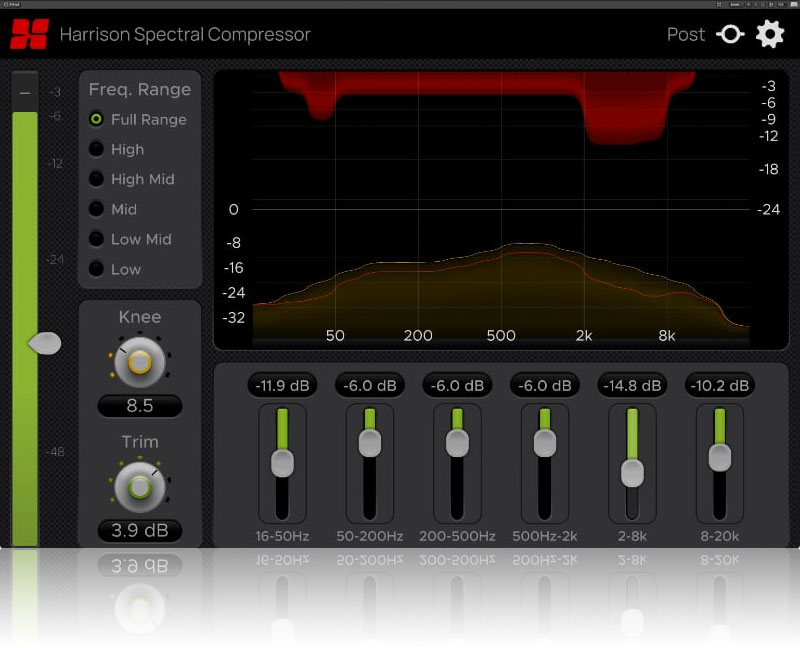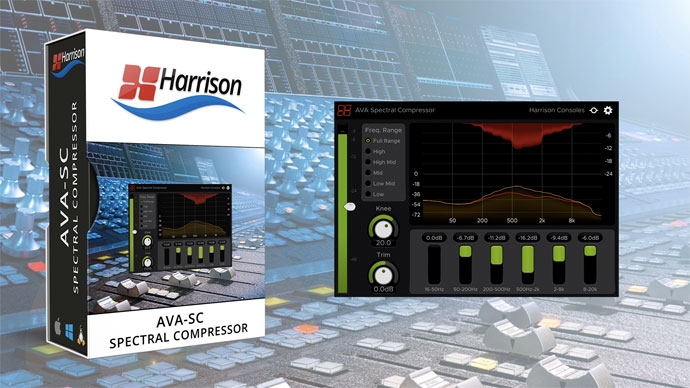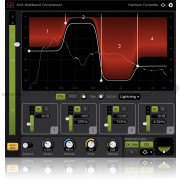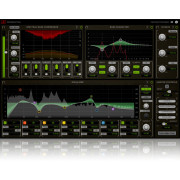You're currently on:

MPC Spectral Compressor

PROFESSIONAL RESULTS, FAST AND EASY!
The Spectral Compressor is a clever dynamics processor that was originally developed for highly demanding film and post-production. It is derived from Harrison’s iconic enterprise class MPC consoles and provides unparalleled accuracy when mastering your mix. It offers 18 spectral bands of dynamic range control allowing you to sculpt the sound of each band individually or use the global controls to adjust the overall tone of your mix. Whether you want to smooth out harsh frequencies, boost the low end, or brighten the highs, Spectral Compressor can handle it.
You can use it as an effective de-esser, a flexible drum bus processor, or even a subtle enhancer for vocals and instruments. No matter what genre you work in, Spectral Compressor will help you achieve a professional and refined sound.
Overview
The Depth sliders below the graph control the maximum amount of gain reduction that can be applied to the corresponding frequency bands determined by the current Range setting. The Range can be set to focus on specific areas along the frequency spectrum (Low, Mid, High, etc.), or it can be set to Full Range mode to allow control over the entire spectrum. The Threshold sets the input signal level where the overall compression begins to take effect. Additional controls include compressor Knee and output Trim.
Controls
Threshold
The slider attached to the input meter on the left is the Threshold control. The Threshold sets the input signal level where the overall compression begins to take effect. The Threshold can be set anywhere between -60 and 0 dB.
Frequency Range
The Frequency Range section allows you to select the specific frequency range that gets processed by the compressor. The 18 compressor bands will be distributed across whatever range is selected. For example, with Mid selected, all 18 bands will be focused on the Mid range, allowing for more precise control over the frequencies within that range.
The available Frequency Range options are as follows:
Full Range, 16 Hz - 20 kHz
High, 3 kHz - 20 kHz
High Mid, 200 Hz - 18 kHz
Mid, 180 Hz - 7 kHz
Low Mid, 12 Hz - 8 kHz
Low, 15 Hz - 500 Hz
Depth Controls
The 6 sliders below the graph set the Depth for their corresponding bands. The 18 compressor bands are divided among the 6 sliders so that each slider controls the Depth for 3 of those bands.
The range of frequencies affected are shown below each slider.
The Depth determines the maximum amount of Gain Reduction that can be applied within each slider’s control range. Possible Depth values range from -24 to 0 dB. Setting a Depth slider to 0 dB will prevent any attenuation from occurring within that slider’s control range.
Knee
The Knee value determines how far the input signal must exceed the threshold in a given band, to incur the full depth for that band. Possible Knee values range from 1 to 30. With a low Knee value (Hard Knee), the compression will activate more abruptly as the signal passes over the Threshold. A high Knee value (Soft Knee) will apply the gain reduction more gradually as the signal passes the threshold.
Output Trim
The Output Trim adjusts the level of the compressor’s output signal anywhere from -10 dB to +10 dB. It can be used to increase or decrease the output level as needed for gain compensation.
Gain Reduction Graph
Provides a visual representation of Gain Reduction across the frequency spectrum. The Reduction curve (red) is displayed above the Input curve (orange-yellow) indicating the amount of Gain Reduction applied and its location along the spectrum. The red line inside the Input curve indicates the level of the compressed signal relative to the input signal.
| Variant | 1 |



















